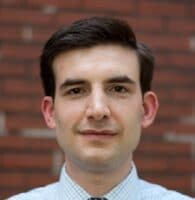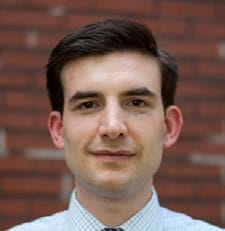Researcher Spotlight: David Russler-Germain, MD, PhD
Washington University School of Medicine

Although genetic mutations can drive the development of cancer, many healthy white blood cells intentionally alter their DNA to generate diverse antibody responses to infections. Dysregulation of this activity may cause the mutation of other genes, however, and may lead to the development of malignancies, such as follicular lymphoma (FL). In his LRF research, Dr. Russler-Germain aims to study how mutations in a gene known as ZNF608 may contribute to the formation of lymphoma. “From our preliminary understanding of ZNF608, we hypothesize it plays a key role in protecting B cells from inappropriate activation of the machinery normally used by immune cells to alter their DNA in response to infections,” he explains. “Loss of ZNF608 may promote acquisition of mutations and lead to accelerated development of lymphoma.”
Dr. Russler-Germain is a Hematology and Oncology Fellow at Washington University School of Medicine in St. Louis, where he also earned his dual MD/PhD studying genetic and epigenetic mutations in acute myeloid leukemia (AML). During his clinical training, he became motivated to pursue a career as a physician-scientist in lymphoma research, driven by the diverse challenges clinicians and patients face with treatment. “The ability to integrate our growing understanding of lymphoma biology with an evolving armamentarium of therapeutic strategies drew me to and motivates me to dedicate my career to helping advance the field and improving the lives of patients with lymphoma,” he says.
Through his LRF research, Dr. Russler-Germain hopes to contribute to the greater knowledge of how lymphoma forms and the underlying biology that drives diverse trajectories within these diseases. “The lymphoma research field is making incredible strides in understanding the complex consequences of the DNA mutations that drive lymphomagenesis, including impact on treatment susceptibility,” he says. “Through generous contributions from patients, the field has built amazing repositories of primary samples to probe for clues into how lymphomas arise and how they can best be treated.”


